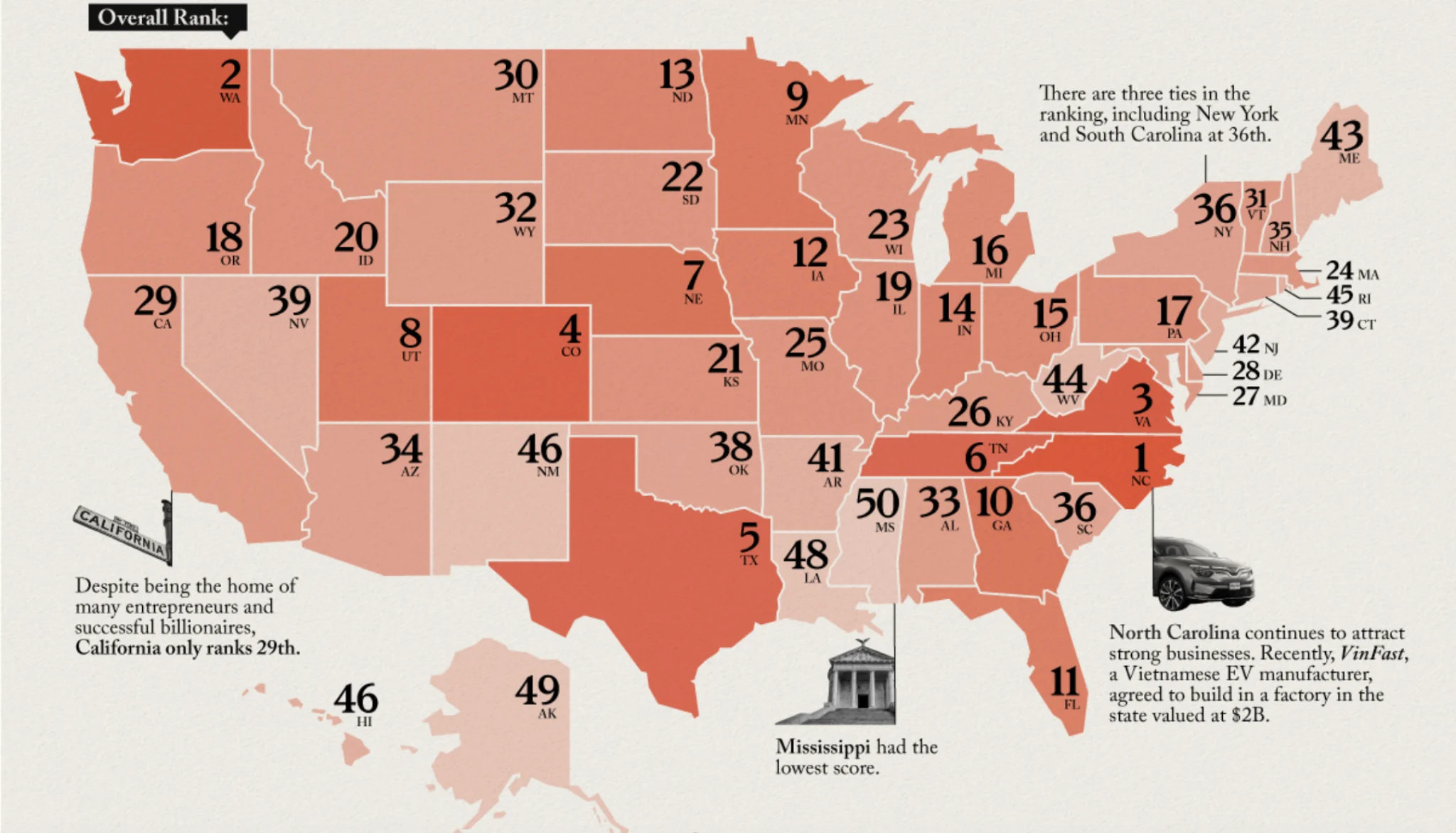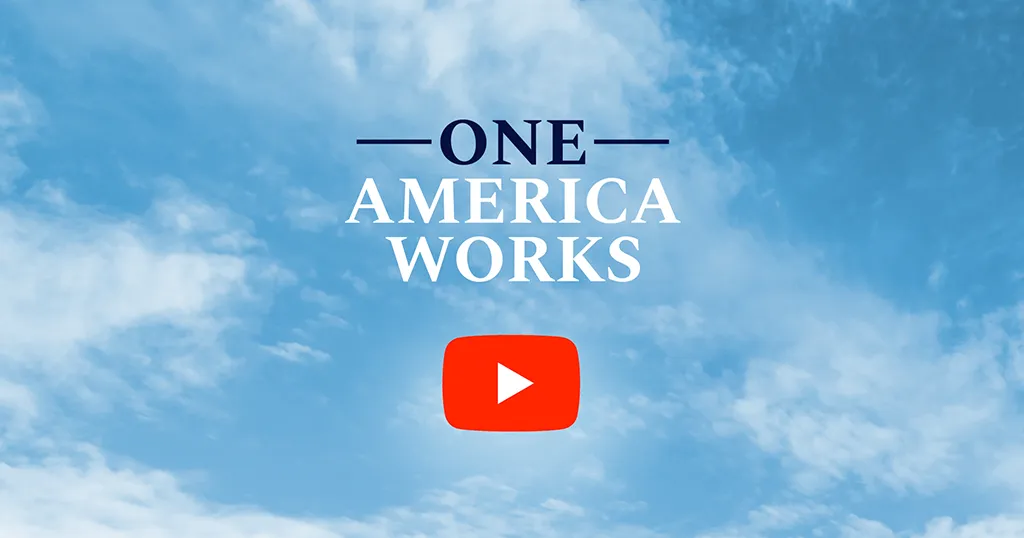For decades, Silicon Valley has held the title of the leading center for technology innovation and disruption, but recently it’s become clear that The Times They Are a-Changin. As I mentioned in our last newsletter, the tech economy in many parts of the country is thriving and already contributing significantly to the national innovation story. So what is it about emerging tech regions that allow critical industries beyond software to flourish? And what can Silicon Valley learn from the Heartland about innovation and the future tech economy?
Hard tech industries like electric vehicles, semiconductors, robotics, and agritech are booming today, and it’s no coincidence that the American Heartland is at the center of this growth. The combination of legacy industrial workforce talent, leading research universities in hard sciences and a welcoming, lower-cost business environment add up. But there’s much more, from infrastructure to regulatory factors, that gives the region a competitive advantage over coastal tech hubs.
According to research by CNBC, North Carolina, Texas, Colorado, Nevada, Utah, and Tennessee are some of America’s best states to do business in. What these states have in common is a welcoming business environment and the resources to help build and scale companies.
Ranked: America’s Best States to Do Business In
Another competitive advantage of the Heartland stems from legacy industries and infrastructure. Normal, IL dubbed itself “EV Town” back in 2011 when it began investing in the automotive space. Despite Mitsubishi shutting down in 2015 (Normal’s biggest auto player at the time), the existing plant and skilled workforce paved the way for Rivian’s success years later. This pattern stretches across the “Battery Belt,” where cities like Detroit are positioned to take the next leap in the automotive space, thanks to the pre-existing manufacturing infrastructure and recent funding.
Location is also crucial when it comes to the supply chain. It makes far more logistical sense to produce silicon chips and auto parts in the center of the country, closer to automakers and other manufacturing operations. Finally, a factor often overlooked is the natural environment that differentiates the Heartland from the coasts. Take AgriTech–an industry that leverages technology to improve efficiency in farming. App Harvest, a leader in the space, has a 60-acre greenhouse in Kentucky that operates completely on rainwater. This concept would be laughably unrealistic in California’s dry climate.
Looking ahead, the next generation of talent may land in the Heartland, thanks to a density of prominent colleges–many of which boast excellent engineering and tech programs. University of Michigan, Georgia Tech, Purdue, Texas A&M University, and Ohio State University all have the potential to retain tens of thousands of alums and leverage their skill sets right in their city. And with the largest startup weekends occurring in cities like Denver, I’m excited to see tech hubs across the country continue to innovate from the inside out.
Inside this issue
- The Next “Big Thing” Is Being Built in the Heartland Right Now
- 3 Agri-Tech Companies We’re Watching This Year
- Founder Friday: Interview with TalkMeUp Founder and CEO JJ Xu
- How a Thriving Semiconductor Industry Is Emerging in the Silicon Heartland
- A Decade After ‘EVTown,’ Rivian Is Making an Illinois City’s Electric Vehicle Vision a Reality
- Expand Your Network at our Virtual OAW Connect Event
- Connecting the Coasts Event on 4/4 in Cleveland
Long-time observers of the tech industry know that disruptive companies emerge from crises. Some of the most prominent players in tech today, including Uber, Airbnb, and Square, were built in San Francisco during the last financial crisis. The age-old adage of necessity being the mother of invention becomes a reality when times get tough. Today’s entrepreneurs who face slowing markets and uncertain futures feel the necessity and invent ways to produce more with less. Read More.
Kentucky-based AppHarvest combines conventional agriculture techniques with modern technology to grow non-GMO, chemical-free produce across America. They’re doing this within massive greenhouses, like their 60-acre greenhouse located in Morehead, Kentucky, which operates entirely on rainwater from a nearby retention pond. Not only do these greenhouses reduce water usage by up to 90 percent, their central locations in America’s heartland allow AppHarvest to reduce the amount of fuel consumed in transportation by 75 percent. Read More.
Costs, connections, and community — a few of the main reasons TalkMeUp Founder and CEO JJ Xu decided to stay in Pittsburgh to build her company. While attending Carnegie Mellon University, JJ focused on building her trust network, always asking for her connections to introduce her to someone new. It’s what she identifies as her super power. Watch the full episode of Founder Friday to learn more about JJ’s story, advice she’d give to new founders, and where she predicts the AI market moving. Watch Here.
Indiana is developing its engineering-rich, high-tech talent base to position the state as a leader in the country’s growing microelectronics manufacturing industry. Indiana is home to 36 universities and colleges, and according to Purdue’s College of Engineering dean, “If you draw a radius of 275 miles around Indianapolis, 30% of the engineering degrees in the U.S. are produced by the universities in that region.” Additionally, while Indiana’s business-friendly culture and solid infrastructure are the two factors that matter most to manufacturers, the state’s relatively low cost of living is enticing to employees themselves. Read More.
Illinois has quietly begun to establish itself as an electric transportation hub. One possible factor working in Illinois’ favor is the atmosphere of receptiveness in the state, in contrast with resistance and other hurdles that Rivian and other companies have sometimes faced in different locations. Along with the availability of an intact manufacturing plant, Rivian and its founder, RJ Scaringe, were attracted to the city’s overall culture and comprehensive plan that includes goals for health, sustainability and community wellness. Read More.
Upcoming Events
Expand Your Network at OAW Connect!
March 9th, 2023 | Virtual Event
Join us online to virtually connect 1-on-1 and expand your network of founders and VC’s from around the country! To register for OAW Connect, Click Here.
Curious Where Tech Is Headed? Come to Cleveland to Find Out!
April 4th, 2023 | Cleveland, OH
Join us in Cleveland, Ohio for a day of learning about entrepreneurship, featuring keynote speaker Steve Case. To register for the Connecting the Coasts to the Heartland Event, Click Here.









